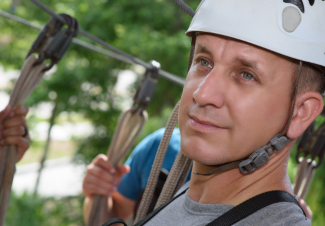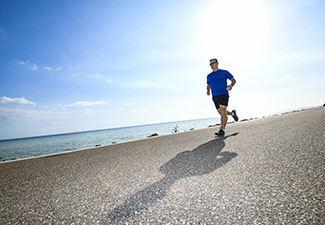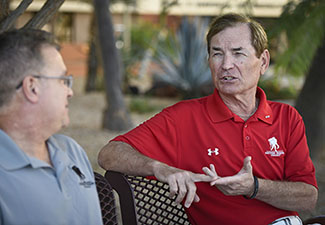A Veteran’s Journey of Resilience Through Jiu-Jitsu

Eric Trinidad’s decision to join the military was deeply personal. After the loss of his cousin in the 9/11 attacks, he enlisted in the Army the following year, determined to serve.
As a combat engineer, Eric was involved in many ground operations in Baghdad, Iraq. Improvised explosive devices (IED) and gunfire were constant threats. Eric sustained an array of injuries during his career, including a head injury in 2005. He also began to have vision problems. But it wouldn’t be until years later that the severity of his wounds would be discovered.
Then, searching for new ways to cope, Eric found martial arts, particularly jiu-jitsu, which became a powerful force in his recovery. The practice gave him a renewed sense of purpose, structure, and community – a combination he credits with saving his life.
Navigating Cultural and Military Stigmas
Born and raised in Puerto Rico, Eric grew up in a culture where seeking help was often stigmatized. This mindset shaped his journey as he tried to navigate the challenges of post-military life.
“Growing up in a Hispanic background, you dealt with stuff yourself,” Eric explained, noting that mental health was not discussed. “If you had to talk to someone, you talked to your pastor, your mother, your grandmother. Going to a therapist was unheard of.”

After returning stateside, Eric joined the reserves and enrolled in college. He met with another Iraqi veteran at the local Vet Center and was inspired.
“We would talk, and he cared so much that he made me want to go to school to be a therapist,” said Eric, who began his career as a veteran service officer in Connecticut.
But while he helped other veterans, his health took a backseat.
Over time, his vision worsened, and Eric began experiencing severe headaches. Staying focused got harder, and reading became more difficult. He struggled to manage his symptoms and his ever-changing emotions.
“Like other veterans, I tried to suppress everything,” said Eric, who was later diagnosed with post-traumatic stress disorder (PTSD). But still, he felt something was amiss.
Connection and Support
Eric learned about the Wounded Warrior Project® (WWP) in 2009, and although he was excited to meet people like himself, he admits he was nervous, too.
“Coming back from the war, I wanted camaraderie. Being around veterans who understood me was my safe zone,” he said. “But my first event was water skiing, and I was self-conscious. Then I looked over and realized the guy next to me had no legs.”
Over the years, Eric turned to WWP™ for connection and support. He attended various alumni events, and after relocating to a new state, he connected with WWP’s Warriors to Work program to update his resume and find new employment.

Eric and wife Ariana at a WWP Soldier Ride.
When Eric realized he needed help managing the symptoms of his PTSD and, later, a traumatic brain injury (TBI), he once again turned to WWP for support.
Clarity at the Gym
For Eric, the gym was not just a place to build muscle but a place to de-stress.
“Working out was my release. I realized how I felt afterward. When I came home, I was relieved, sore, but it felt good,” Eric shared.
After grad school, the gym became a safe space for Eric, helping him to keep intrusive thoughts at bay. “Despite working as a therapist and helping other people, I still had my own demons to deal with. And because I worked at [Veteran Affairs] at the time, it was hard to get treatment because my psychiatrist was my colleague,” he explained.
The gym also served as a matchmaker. Eric met his wife, Ariana, when he tried CrossFit.
A Clear Answer
By early 2012, though his body was in great shape, Eric’s brain was not. He was having increased memory issues and attention challenges. Debilitating migraines resulted in multiple emergency room visits. His vision continued to worsen, and as it did, the more depressed he became. Suicide crossed his mind.
“I couldn’t remember what I had for breakfast, let alone try to pay bills. There was so much frustration because they didn’t have a label on it yet. I wasn’t even 30 years old, and I saw how fast I was deteriorating,” Eric said.

But finally – more than seven years after he left the military – someone put all the pieces together.
Eric’s symptoms were partly caused by his PTSD and partially by a traumatic brain injury he never knew he had. His vision issues were a result of the brain no longer communicating effectively with his optic nerve.
“The VA was just learning about TBI overlapping with PTSD,” he said. “If I had gotten treated for both of them earlier, I would have likely had a better outcome.”
Over the next few years, Eric focused on what he could control. He continued working and finding solace in the gym. He took up powerlifting and began competing nationally. He won several titles and enjoyed traveling with his wife and connecting with other veterans.
Life was good, Eric said.
At Risk of Tapping Out
In May 2020, at the height of the COVID-19 pandemic, Eric was involved in a car accident. He sustained another TBI as well as numerous physical injuries. Eric spent five days in intensive care, but due to COVID restrictions, his wife couldn’t visit. He underwent several surgeries to address the wounds.
When he finally came home, Eric required significant support. Simple things like cooking, bathing, and dressing required assistance. A spinal injury affected the sensation in his legs, which made walking difficult and working out nearly impossible. Eric also developed vertigo, a speech impediment, and began having seizures. His ability to swallow was affected, which increased his risk of choking.
|
If you, or someone you know, needs support, you can call, text, or chat with the National Suicide Prevention Lifeline. Call 988 or contact the Crisis Text Line by texting "TALK" to 741741 |
The latest brain injury also accelerated his vision loss. “It was inevitable. I knew my sight would decrease over time, but after the accident, it progressed faster,” said Eric.
The worst time, he said, came after he could no longer drive. “That was a hard pill to swallow. It was the most difficult time of my life. I was 39. My independence went out the window.”
Anger issues led to self-harm and depression to multiple suicide attempts.
“Everything turned upside down, and I didn’t know how to handle it," Eric said.
Finding a Second Chance on the Mat
Amid his pain, though, Eric found a second chance, thanks to his wife’s persistence.
Getting misty at the memory, Eric re-counted Ariana’s words: “She said, ’You need to put more effort in.’ She believed in me more than I believed in myself.”
Eric meditated and prayed. When he was cleared to work out, he turned back to exercise. He started with golf, but it wasn't love. He took up cycling and participated in Soldier Ride®, a multi-day adaptive sports event. Then he signed up for Brazilian jiu-jitsu, a sport he had always wanted to try.

Eric with Regis Calixto de Lima, his instructor from Ralph Gracie Academy.
Although nervous because he was now legally blind, Eric said his vision wasn’t an issue. “When I’m here, I’m not Eric, the visually impaired veteran. I’m just Eric. I’m treated like any other student," he said.
Practice improved Eric’s outlook. “I did it two to three times a day, five times a week. The more I did it, the better my mood got,” Eric said, adding that he also found camaraderie with his fellow athletes – something he was missing after leaving the military.
Jiu-jitsu also forced Eric to slow down and focus, which has helped improve his overall quality of life.
“Because I can’t see my opponent, I must calm myself down and rely on my other senses,” explained Eric. “I have to think about all the possibilities because I don’t know what they will do. Things are constantly in flux during a match. Is he going left, right? My problem-solving skills are in play when I am on the mat.”
Eric, who has achieved the rank of first-degree blue belt, credits jiu-jitsu with helping him regain not only his physical strength but also his mental resilience. “Jiu-jitsu saved my life.”
Independence and Healing with WWP
After his accident, Eric’s wife contacted WWP, looking for resources to help them. She learned that Eric qualified for the Independence Program, which provides support to warriors living with injuries that significantly impact their independence, such as a moderate to severe brain injury, spinal cord injury, or neurological conditions.
No matter how tough the battle, there is always a path to healing and triumph.
One benefit of the program is that Eric now has a personal coordinator who transports him to jiu-jitsu lessons. “Before, it was such a huge burden on my wife, juggling work, then driving home to turn around and drive me across town to lessons. Wounded Warrior Project has made it possible for me to train every week, which is a great stress reliever and allows me to be more independent,” said Eric.
WWP also helped Eric learn new ways to manage his PTSD and TBI symptoms. In November 2020, Eric traveled to Boston to participate in Warrior Care Network, an accelerated brain health program at Road Home at Massachusetts General Hospital, which helped him understand what happened to his brain and how to better handle challenges.
“I can’t erase my memories or my emotions, but if I have a time when things creep up, instead of an episode lasting for days, it will last hours. I know how to cope and handle it now.”
Watch: Warrior Finds Healing Through Jiu-Jitsu
A Vision for the Future
For the first time in years, Eric is excited about his future. Despite ongoing pain from the car accident, he feels healthier than ever, both mentally and physically. He hopes to become a jiu-jitsu instructor and open an academy.
As Eric prepares to compete in several upcoming jiu-jitsu tournaments, he reflects on his journey with gratitude.
“My biggest downfall was not realizing it was okay to ask for help. I kept thinking, I went to war, I’m a therapist, I can handle this. I was wrong,” Eric admitted. “Now, I’m able to see things outside my daily life with a different perspective. I have an amazing wife, people who care for me, and a great life.”
His advice to other veterans: “No matter how tough the battle is, there is always a path to healing and triumph.”
Contact: Cynthia Weiss – Public Relations, cweiss@woundedwarriorproject.org, 904.738.2589
About Wounded Warrior Project
Since 2003, Wounded Warrior Project® (WWP) has been meeting the growing needs of warriors, their families, and caregivers — helping them achieve their highest ambition. Learn more about Wounded Warrior Project.



